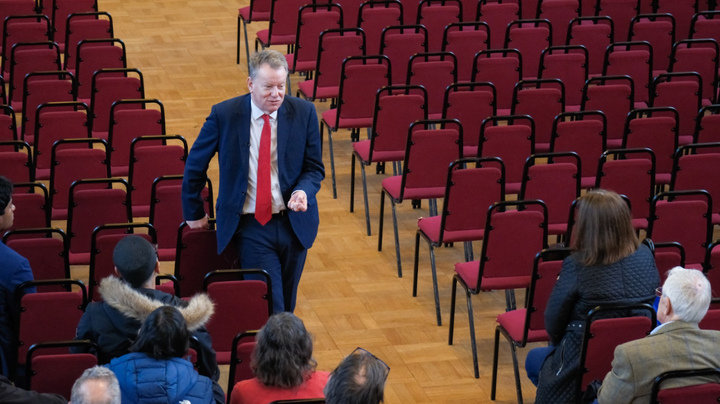Is tax theft?

Gauri Khanna
‘Individuals have rights, and there are things no person or group may do to them (without violating their rights)’.
In the opening line of Anarchy, State and Utopia, Robert Nozick lays the foundation for the libertarian assertion that no state more extensive than the minimal one can be justified (Nozick, 1974). In describing such a state, he alludes to a ‘night-watchman’ form of government that seeks only to maintain these individual freedoms through the use of the military, police and courts (Kateb, 1976). Thus, for libertarians like Nozick, extending the state’s function to redistribute income has no place in a society that respects the right to private property- for them, taxation is not only theft but on par with forced labour (Nozick, 1974).
But what constitutes theft? And does taxation truly meet these criteria as Nozick claims? According to the UK Theft Act of 1968, it is defined as the ‘dishonest appropriation of property belonging to another, with the intention of permanently depriving the other of it’. Here, ‘appropriation’ indicates assuming the identifiable owner’s rights to the property, ‘dishonest’ refers to the absence of consent from the owner, and the notion of ‘permanent deprivation’ holds even if the offender wishes to dispose of the property in a certain, even virtuous, manner (CPS, 1968).
I recognise the importance of exercising caution with the legal definition, since of course, by law, taxation is not theft. Hence, in this essay, I seek to assess the extent to which taxation shares the three aforementioned characteristics of theft to determine whether this aspect of the law is self-contradictory.
1) Appropriation
Foremostly, for property to be appropriated unjustly as per the strict definition, the original ‘appropriator’ must have acquired it rightfully from the state of nature. This must be followed by just transfer to all subsequent owners until the chain is broken by the act of theft.
Adherents of the view that tax is theft would therefore need to prove that the accession of items in their natural state to one’s possession is morally acceptable. They may do so through the ‘labour-mixing’ theory put forth by John Locke; he postulates that each person owns their physical or mental labour, and if they mix this labour with something in the state of nature to make it more fruitful than it was in isolation, they come to own the product of this combination (Tuckness, 2005). To extend this idea, Nozick added a second clause to his theory of entitlement- that of justice in transfer, which states that individuals must freely resign ownership of property to another (Nozick, 1974). Generally, this occurs when the former receives fair monetary compensation for its sale. As a result, taxation, which is an involuntary government charge on one’s earnings, violates the process of just transfer for those who have rightfully acquired property and could be seen as a form of ‘dishonest appropriation’.
To counter these historical principles of justice, proponents of a system of taxation would argue that it is impossible to determine just appropriation and transfer for every economic transaction, particularly monetary ones. By extension, they may propose that not everyone has a moral right to their pre-tax income because the market’s unpatterned way of distributing such incomes can rarely be what the recipient deserves, relative to what others get. For example, the vast disparity in the pre-tax income of investment bankers and scientific researchers is hardly morally justified (Goff, 2014). Similarly, taking Locke’s idea of labour-mixing as a basis for just appropriation, Karl Marx would view a capitalist’s profits as breaching this condition through the exploitation of ‘surplus value’ - the difference between workers’ wages and the value their labour added to the capitalist’s goods (Marx, 1968). It could hence be asserted that policymakers have not just a right but a duty to redistribute pre-tax incomes to an extent, to correct the unjust distribution created by the free market.
The notion of the original owner’s rightful appropriation being a prerequisite for the act of theft to have occurred can be used for and against a system of taxation. Whilst there are well-reasoned arguments that nobody can enjoy truly and historically justified ownership of property, there are equally as rational ones to suggest that this outlook is functionally impractical and that property rights should be respected if they result from the fruits of one’s labour or the willing transfer of another’s.
2) Consent
Determining whether taxation meets the second criterion of theft, that of ‘dishonest’ appropriation, requires a more in-depth analysis of Nozick’s principle of ‘justice in transfer’ of property mentioned earlier. For this view to be substantiated, a clear lack of the holder’s consent must be ascertained when surrendering income to the state.
Those who disagree with this outlook say that we tacitly consent to taxation as citizens of a country who enjoy privileges like national defence and the court system. Such provisions are not present in the state of nature due to the ‘unsociability of men’, as phrased by Thomas Hobbes (Gribnau and Dijkstra, 2019). Therefore, if we choose to benefit from the state’s services, we have a political obligation to pay taxes. Concerning those who insist that not everyone subscribes to the social contract, supporters of taxation would encourage these philosophical anarchists to refrain from dwelling among states, arguing that there is no institution mandating them to remain under a system of taxation with which they disagree (Bamford, 2020). Additionally, proponents of this view highlight that the process of voting in representative democracies means that all legislature, including taxation, is consented to, since it is approved by elected officials and thus by majority vote (Tuckness, 2005).
In response, libertarians would argue that tacit consent does not hold for those who have never thought about what a social contract is, nor those openly averse to taxation. The latter, as David Hume proposed, cannot necessarily leave their country freely ‘when he knows no foreign language or manners’(Bamford, 2020), or more relevantly, due to immigration laws, financial constraints, political conflict or worldwide pandemics. Regarding consent through elected officials, those who oppose taxation contend that representative democracy results in the tyranny of the majority over the minority, especially when the voted-in measures violate individual rights, as does taxation. They would claim that the majority, whose votes politicians depend upon to maintain power, generally have the least taxable incomes and subsequently, policymakers acquiesce to their calls for public expenditure by disproportionately - or ‘progressively’- taxing high-income earners (the minority) (Bruce, 1920). Moreover, they would indicate that not only do government bodies mandate taxation, but they also employ the threat of force to administer it against those who refuse to consent (Kagan, 2022). This violates the ‘non-aggression principle’ which philosophers like Ayn Rand and Murray Rothbard, who coined the term, view as a tenet of a free society (Long, 2008).
Therefore, there is debate over whether simply living within a country’s borders and as Locke put it, ‘travelling freely on its highways’, constitutes legitimate consent to a state’s taxation laws (Tuckness, 2005). Even so, Locke himself, who proposed the doctrine of tacit consent, noted that this could be explicitly disavowed by individuals. This, combined with the infeasibility of abandoning property to emigrate, could arguably make all openly nonconsensual taxation ‘dishonest appropriation’.
3) Permanent deprivation
Taxation would fulfil the final condition to ‘qualify’ legally as theft if it deprives the citizen of the ability to dispose of that property themselves. By UK law, the intent to ‘permanently deprive’ holds even if the offender’s use of that property benefits the original owner, unless through repayment of the stolen material itself (CPS, 1968).
Libertarians would say that this description perfectly mirrors taxation; regardless of how the government spends tax revenue, the exact monetary balance is not returned to the taxpayer. For them, even if this expenditure contributes to the provision of goods and services they value, like healthcare, roads and street lighting, the act of seizing their income to finance them is still theft. Instead, they may suggest that only those who contribute financially towards their provision should be able to reap the benefits, proportional to their contribution (Niemietz, 2013). After all, public goods are subject to the free-rider problem (Pettinger, 2019) and as voiced by Margaret Thatcher, ‘there is no public money, only taxpayers’ money’, indicating that under the current system, someone (the taxpayer) has to pay for what everyone (the public) may enjoy (Thatcher, 1983). Additionally, those who liken taxation to theft perhaps believe that societal gain is minimal from the revenue’s disposal, rendering this theft gratuitous. They may see our elected officials as incapable of conducting government spending effectively, claiming, for example, that the UK state is currently caught between a welfare and night-watchman one, where Scandinavian-level tax rates seem to return only longer NHS waiting lists and police inaction at everyday crimes (Robinson, 2022).
Whilst those in favour of taxation might agree with the notion that various government failures can cause public spending to be conducted inefficiently, they would not imply the abolishment of taxation as the solution. For them, redistribution has virtues that theft lacks since the provision of social services and welfare is ultimately more valuable to society than their cost to individuals (Whyte, 2017). Given that UK legislation disregards the outcome to society when characterising an act as theft, supporters of taxation may concede that the act of collecting it prevents people from using part of their property autonomously, but not ‘regardless of rights’ as the Theft Act claims (CPS, 1968); rather, redistribution guarantees the basic rights of all citizens, wealthy or not, many of which are described by the Universal Declaration of Human Rights as ‘equal and inalienable’ (United Nations, 1948). As a result of these rights being ubiquitous, those who hold this view would oppose the contributory welfare notion advanced by libertarians, adding that the richest members of society, who often pay the least tax due to unrealised capital gains (Marshall, 2021), may still benefit from public services.
Hence, there is little doubt about the potential of taxation to benefit and sustain a healthy society, especially as in its absence, there is no incentive for individuals to fund non-excludable services. Yet, whatever the true intent of the state that takes property from its citizens, there is no way to circumvent the act of taking it and thus ‘depriving’ owners of the right to dispose of it themselves.
In conclusion, my approach to exploring the statement in question- that of assessing the parallels between my country’s legal definition of theft and the characteristics of taxation- has led me to realise that there are many instances in which income redistribution matches the three principal conditions that make an act ‘theft’; the state assumes our ownership rights to the taxed property, does so regardless of our explicit consent and disposes of it such that we are permanently deprived of the ability to do so. In this sense, the law seems conflicting given theft is illegal and taxation is not.
However, this does not necessarily answer the question of whether taxation is justified. Can theft ever be justified? Is a destitute person justified in stealing bread for survival from a supermarket? It appears that the answer to this question depends on one’s conception of what this virtue constitutes; for a man like Robert Nozick, justice concerns preserving the liberty of individuals, which includes the utmost protection of private property. Conversely, his Harvard colleague and rival, John Rawls interprets justice as promoting the liberty of society as a whole, and in his work, A Theory of Justice (Rawls, 1971), he proposes that the state arrange social and economic inequalities in a way that works in favour of the most disadvantaged people.
As someone who values living in a society where everyone may access essential services, live with dignity and make the most of their existence through equal opportunities to succeed, I would adopt Rawls’ view on taxation. Therefore, whilst tax may meet the legal criteria of theft, for me, it is certainly justified.
Bibliography:
1) Nozick, R. (1974). Anarchy, State, and Utopia. Oxford: Basil Blackwell, pp.ix, 151, 169.
2) Kateb, G. (1976). The Night Watchman State. The American Scholar, [online] 45(1), p.816. Available at: https://www.jstor.org/stable/pdf/41207372.pdf?refreqid=excelsior%3A46f7cc15a79a38 6425f343d6e3d550ab&ab_segments=&origin=&initiator=&acceptTC=1 .
3) CPS (1968). Theft Act Offences | The Crown Prosecution Service. [online] Cps.gov.uk. Available at: https://www.cps.gov.uk/legal-guidance/theft-act-offences.
4) Tuckness, A. (2005). Locke’s political philosophy. [online] Stanford Encyclopedia of Philosophy (Winter 2020 Edition). Available at: https://plato.stanford.edu/entries/locke-political/.
5) Goff, P. (2014). No it’s not your money: why taxation isn’t theft. [online] Tax Justice Network. Available at: https://taxjustice.net/2014/10/08/money-taxation-isnt-theft/.
6) Marx, K. (1968). Theories of surplus value. Part 2. London: Lawrence & Wishart, pp.463–464.
7) Gribnau, H. and Dijkstra, C. (2019). Contractualism and Tax Governance: Hobbes and Hume. [online] Social Science Research Network. Available at: https://papers.ssrn.com/sol3/papers.cfm?abstract_id=3736126.
8) Bamford, D. (2020). The Social Contract, Tacit Consent, and International Taxation. [online] Afronomicslaw.org. Available at: https://www.afronomicslaw.org/2020/07/15/the-social-contract-tacit-consent-and-intern ational-taxation.
9) Bruce, A.A. (1920). The Tyranny of the Taxing Power. Michigan Law Review, 18(6), p.508. doi:https://doi.org/10.2307/1277807.
10) Kagan, J. (2022). Taxation Defined, with Justifications and Types of Taxes. [online] Investopedia. Available at: https://www.investopedia.com/terms/t/taxation.asp. Gauri Khanna Word count (excluding bibliography) = 1998
11) Long, R.T. (2008). Non-Aggression Principle. [online] Libertarianism.org. Available at: https://www.libertarianism.org/topics/non-aggression-principle.
12) Niemietz, K. (2013). Contribution vs. redistribution: why contributory welfare won’t happen. [online] Institute of Economic Affairs. Available at: https://iea.org.uk/blog/contribution-vs-redistribution-why-contributory-welfare-wont-ha ppen.
13) Pettinger, T. (2019). Free Rider Problem | Economics Help. [online] Economicshelp.org. Available at: https://www.economicshelp.org/blog/1626/economics/free-rider-problem/.
14) Thatcher, M. (1983). Speech to Conservative Party Conference | Margaret Thatcher Foundation. [online] Margaretthatcher.org. Available at: https://www.margaretthatcher.org/document/105454.
15) Robinson, D. (2022). The night-watchman welfare state. [online] The Economist. Available at: https://www.economist.com/britain/2022/11/10/the-night-watchman-welfare-state.
16) Whyte, J. (2017). Is Owen Jones right that taxation is theft? — Institute of Economic Affairs. [online] Institute of Economic Affairs. Available at: https://iea.org.uk/is-owen-jones-right-that-taxation-is-theft/.
17) United Nations (1948). Universal Declaration of Human Rights. [online] UN.org. Available at: https://www.un.org/en/about-us/universal-declaration-of-human-rights.
18) Marshall, M. (2021). How the rich avoid paying taxes. [online] www.youtube.com. Available at: https://www.youtube.com/watch?v=t6V9i8fFADI.
19) Rawls, J. (1971). A Theory of Justice. Oxford: Oxford University Press, p.65




Comments ()